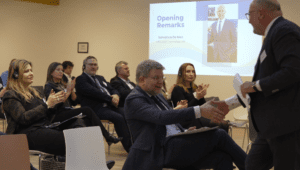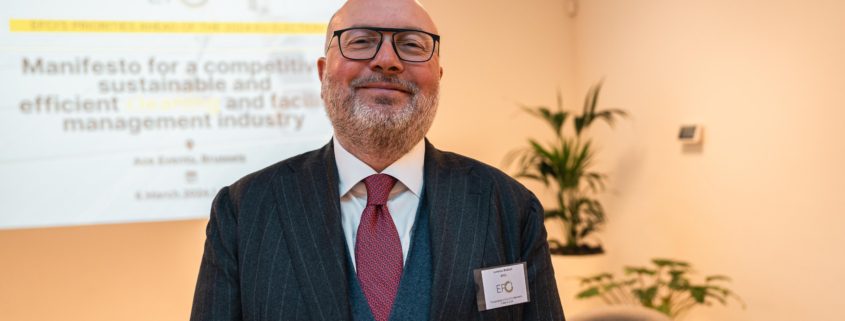Interview with Lorenzo Mattioli – looking at EFCI’s Manifesto
Question 1: Mr. Mattioli, could you elaborate on the significance of actively advocating for the representation of the labor-intensive services industry at the EU level, and why it’s crucial for policymakers to understand its unique challenges and contributions?
Mattioli:. Advocating for representation of the labor-intensive services industry at the EU level is paramount due to its significant contribution to the economy and employment. Our industry, with its annual turnover of 120 billion € and almost 4 million employees, is part of a larger and unified economic sector that provides essential services to the Europeans. Services like cleaning, catering, security – just to name a few – must be at the centre of policymakers’ attention, in a way that has never actually happened before.. By highlighting our sector’s importance, we aim to ensure that policymakers build and implement policies that not only support our growth but also address our specific needs, promoting an environment conducive to sustainable development and prosperity.

Question 2: During your presentation, you emphasized the need for a specific portfolio within the European Commission dedicated to the labor-intensive services industry. How do you envision this facilitating better interaction with policymakers and addressing the industry’s concerns effectively?
Mattioli: Absolutely, establishing a specific portfolio within the European Commission for the labor-intensive services industry is crucial for effective policy dialogue and advocacy. This specific interlocutor would serve as a dedicated focal point for engaging with policymakers, providing them with in-depth insights into our industry’s dynamics and challenges. By facilitating direct interaction and understanding, we can work collaboratively to develop policies that promote our industry’s growth and sustainability.

Question 3: The Manifesto highlights the importance of a stable and predictable regulatory environment for businesses. How can policymakers strike a balance between implementing necessary regulations and ensuring that they do not block the autonomy and initiative of social partners, as emphasized by Ms. Cuijc during the panel discussion?
Mattioli: Ms. Cuijc’s point is one of the foundations of EFCI’s message. While regulation is necessary for ensuring standards and fairness, unnecessary rules can slow down innovation and growth. Policymakers must engage with social partners and industry stakeholders to develop regulations that are effective, practical, and supportive of business autonomy. This approach raises a favorable environment for businesses to succeed while encouraging social responsibility. As a social partner organization itself, EFCI attributes a lot of importance to social dialogue, demanding that its autonomy be respected. By ensuring regulatory stability and predictability, policymakers can support investment, innovation, and job creation within the cleaning industry.

Question 4: Mr. Jouanny emphasized the significance of public procurement in the cleaning industry, particularly in ensuring quality service and sustainable financial conditions for companies. Can you share your insights on how the proposed revisions of EU public procurement provisions will benefit the industry and promote fair competition?
Mattioli: Revising EU public procurement provisions tailored to labor-intensive services is vital for ensuring fair competition and quality service delivery. Public procurement represents a significant portion of our industry’s turnover, with some EU countries relying on it for up to 50% of their revenue. By introducing price-revision mechanisms and promoting transparency, these changes can create a level playing field for companies while enhancing service quality and sustainability. Ultimately, this benefits both businesses and consumers equally by ensuring efficient and cost-effective procurement processes that deliver value for money.

Question 5: The Manifesto underscores the importance of skill acquisition and recognition in the cleaning industry. Could you elaborate on the suggested framework for a common training certification for cleaning operations across Europe and its potential impact on workforce mobility and professionalism within the sector?
Skill acquisition and recognition are central to the professionalization of the cleaning industry. The proposed framework for a common training certification across Europe aims to normalise skills development and qualifications, improving workforce mobility and professionalism.. By establishing a framework for common training certification, we can elevate the standards of our industry, attract and retain talent, and ensure the provision of high-quality services to our clients.



